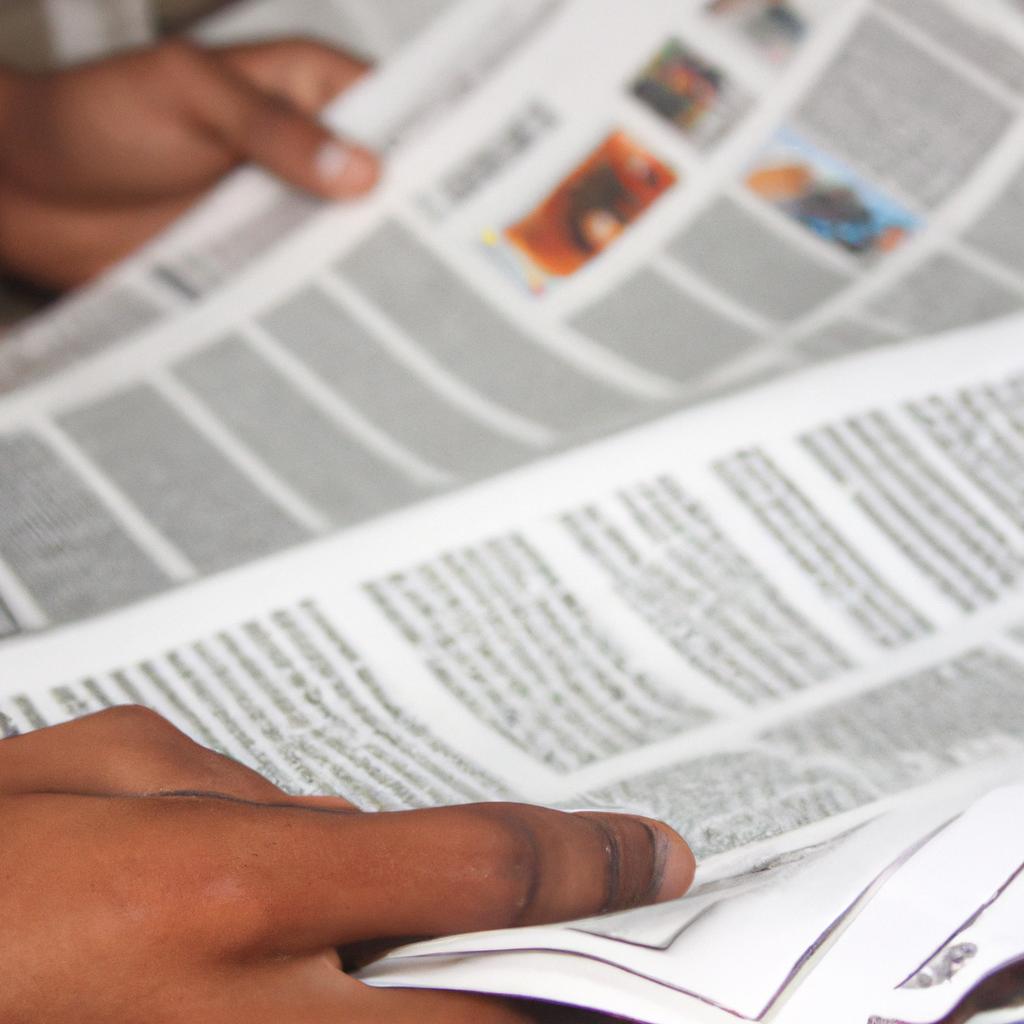Introduction
Editorial independence is a crucial aspect of the news media industry, as it ensures that journalists and editors can operate with autonomy in reporting news without undue influence from external forces. This principle serves as a cornerstone for maintaining objectivity and fairness in journalism, allowing news organizations to fulfill their role as impartial watchdogs for society. However, questions surrounding editorial independence have become increasingly relevant due to concerns about news bias. In this article, we will explore the concept of editorial independence in the context of news media industry, analyzing how potential biases can arise and examining the implications they may have on public perception.
To illustrate the impact of editorial independence on news bias, consider a hypothetical scenario where a prominent news outlet is owned by a powerful corporation heavily involved in the pharmaceutical industry. In this situation, there exists a possibility for biased reporting regarding health-related issues such as drug efficacy or safety regulations. The corporate ownership could exert subtle pressure on journalistic decisions through various means like financial incentives or indirect influence over content selection. Consequently, readers may be presented with an incomplete or distorted view of important matters pertaining to public health policy. Such instances exemplify why understanding and safeguarding editorial independence are vital in order to maintain transparency and accountability within the news media industry.
In light of these considerations , it is essential for news organizations to establish and uphold robust policies and practices that protect editorial independence. This includes having clear guidelines on conflicts of interest, ensuring diverse perspectives are represented in news coverage, and providing journalists with the necessary resources and support to carry out their work without interference.
Furthermore, media consumers also play a crucial role in upholding editorial independence. By being aware of the potential biases that may exist within the news landscape, individuals can actively seek out diverse sources of information and critically evaluate the content they consume. Engaging in media literacy education and supporting independent journalism initiatives can also contribute to a healthier media ecosystem.
In conclusion, editorial independence is indispensable for maintaining the integrity and credibility of the news media industry. It allows journalists to report objectively on issues of public importance without undue influence from external forces. By understanding the challenges to editorial independence and actively supporting efforts to preserve it, we can ensure that news remains a reliable source of information for society.
Media ownership and its impact on editorial independence
Media ownership plays a significant role in shaping editorial independence within the news media industry. When media organizations are owned by large conglomerates or individuals with vested interests, it raises concerns about potential bias and compromised journalistic integrity. To illustrate this point, let us consider the hypothetical case of a major newspaper being acquired by a wealthy businessman known for his political affiliations.
One key impact of media ownership on editorial independence is the potential for undue influence over the content and direction of news coverage. In our hypothetical scenario, the new owner may use their position to promote their own agenda or suppress information that goes against their interests. This can result in biased reporting, omission of important stories, or even outright censorship. Such practices undermine the fundamental principles of journalism and compromise public trust in the media.
The consequences of compromised editorial independence extend beyond individual news outlets. They have broader implications for society as a whole. A lack of diverse perspectives and independent voices hampers democratic discourse and impairs citizens’ ability to make informed decisions. Moreover, when media organizations prioritize profit motives over truthful reporting, they contribute to misinformation and disinformation campaigns that further erode trust in traditional news sources.
These issues emphasize the need for safeguards to protect editorial independence from undue influence. Implementing strict regulations to limit concentration of media ownership is one possible solution. Additionally, fostering transparency regarding ownership structures and funding sources can help readers evaluate potential biases.
In considering these challenges, it becomes evident that maintaining strong editorial independence requires not only legal frameworks but also an unwavering commitment from journalists themselves to uphold ethical standards and resist external pressures. The subsequent section will delve into the crucial role played by journalists in ensuring editorial integrity without compromising journalistic autonomy – a vital step toward preserving democracy’s fourth estate function.
| Potential Consequences |
|---|
| Biased Reporting |
| Suppression of Information |
| Censorship |
| Diminished Public Trust |
The role of journalists in maintaining editorial integrity
Transitioning from the previous section on media ownership and its impact on editorial independence, it is crucial to examine the role of journalists in maintaining editorial integrity. By understanding how journalists contribute to news reporting, we can further evaluate the potential for bias in news media.
One example that illustrates this point is the case of a journalist who receives pressure from their superiors to alter or omit certain information in a news article. This could occur due to corporate interests or external influences seeking to manipulate public opinion. In such instances, journalists face ethical dilemmas as they must navigate between satisfying their employers’ demands and upholding journalistic values of objectivity and truthfulness.
To delve deeper into this issue, let us now explore several factors that influence the actions and decisions made by journalists:
- Professional ethics: Journalists are bound by professional codes of ethics which emphasize principles like accuracy, fairness, and impartiality. These guidelines serve as benchmarks for responsible journalism.
- Personal biases: No individual is entirely free from personal biases. Journalists may inadvertently allow their own perspectives to shape their reporting, potentially leading to biased coverage.
- Newsroom culture: The overall atmosphere and culture within a news organization play a significant role in shaping journalistic practices. A supportive environment that encourages critical thinking and independent inquiry can enhance editorial integrity.
- External pressures: Journalists often face external pressures ranging from political interference to financial constraints imposed by media organizations. Such pressures have the potential to compromise editorial independence.
- Trust erosion: When readers perceive bias or lack of transparency in news reporting, trust in the media diminishes.
- Democracy at stake: If news outlets prioritize profit motives over informing the public accurately, democratic societies suffer.
- Manipulation of narratives: Biased reporting can manipulate public perceptions on important issues by selectively presenting facts or distorting information.
- Polarization amplification: Media bias contributes to societal divisions by reinforcing existing beliefs and deepening ideological divides.
Furthermore, we can evoke another emotional response by presenting a table:
| Factors Influencing Journalistic Integrity | Examples |
|---|---|
| Commercial interests | Advertising revenue influencing news content |
| Political pressure | Governments attempting to control media narratives |
| Corporate ownership | Media outlets owned by conglomerates with vested interests |
| Digital era challenges | Speed of reporting leading to inaccuracies or lack of verification |
In conclusion, journalists play a critical role in maintaining editorial integrity. However, they face various internal and external factors that may compromise their ability to provide unbiased and objective news coverage. It is essential for both journalists and the public to be aware of these influences and work towards preserving an independent press that upholds the principles of journalism.
With an understanding of how journalists navigate potential biases, it is vital to explore the influence advertisers have on news content.
The influence of advertisers on news content
The Role of Journalists in Maintaining Editorial Integrity
Having examined the concept of editorial independence in the news media industry, it is essential to understand the crucial role journalists play in maintaining editorial integrity. By adhering to ethical standards and professional guidelines, journalists contribute significantly to ensuring unbiased reporting and preserving the trust of their audience.
One example that highlights the importance of journalists’ role in upholding editorial integrity is the Watergate scandal uncovered by investigative reporters Bob Woodward and Carl Bernstein for The Washington Post. Their relentless pursuit of truth and commitment to impartiality allowed them to expose corruption at the highest levels of government, ultimately leading to President Richard Nixon’s resignation. This case serves as a testament to how journalistic dedication can hold those in power accountable and safeguard the public interest.
To maintain editorial integrity, journalists must adhere to certain practices:
- Objectivity: Reporters should strive for neutrality when presenting information or viewpoints, avoiding personal biases that may influence their reporting.
- Verification: Ensuring accuracy through fact-checking and seeking multiple sources helps prevent dissemination of false or misleading information.
- Transparency: Being transparent about potential conflicts of interest or affiliations enhances credibility and allows readers to evaluate content with full knowledge.
- Independence: Resisting external pressures from political figures, advertisers, or other stakeholders ensures that journalism remains free from undue influence.
Table 1: Examples illustrating journalistic adherence to ethics
| Ethical Principle | Example |
|---|---|
| Objectivity | Providing balanced coverage on controversial issues |
| Verification | Cross-referencing facts with official documents |
| Transparency | Disclosing any financial interests related to reported topics |
| Independence | Investigating corporate wrongdoing without fear or favor |
By embracing these principles, journalists can foster an environment where objective news reporting thrives. However, challenges remain within this dynamic landscape. In our subsequent section on “The challenges of political bias in news reporting,” we will explore how political ideologies can impact journalistic objectivity and the potential consequences for media integrity.
The challenges of political bias in news reporting
The influence of advertisers on news content has long been a concern in the news media industry, but it is not the only challenge that undermines editorial independence. Another significant issue is the presence of political bias in news reporting. This section will explore the challenges associated with political bias and its impact on the objectivity and credibility of news.
To illustrate this point, let us consider a hypothetical scenario where a prominent news outlet provides coverage on an upcoming election. The outlet’s parent company holds strong affiliations with one of the political parties involved in the election. Despite claims of unbiased reporting, there are concerns that the outlet may inadvertently or intentionally slant their coverage to favor their affiliated party. Such biases can manifest through selective story choices, framing techniques, or even subtle language nuances.
Political bias in news reporting presents several challenges that deserve attention:
-
Loss of trust: When readers perceive biased reporting, they may question the credibility and integrity of the entire news organization. Trust is fundamental for any successful media entity, and once lost, it becomes difficult to regain.
-
Polarization: Biased reporting can contribute to societal polarization by reinforcing existing beliefs and amplifying divisions between different ideological groups. This can hinder constructive dialogue and impede efforts towards finding common ground.
-
Disinformation spread: Political bias often leads to inaccurate or incomplete information being disseminated to the public. In today’s digital age where misinformation spreads rapidly, such inaccuracies can have far-reaching consequences for society at large.
-
Impaired democratic process: An informed citizenry is crucial for a functioning democracy. If citizens receive biased information from trusted sources, it hampers their ability to make independent decisions based on facts rather than preconceived notions influenced by partisan narratives.
Table 1 below summarizes these challenges:
| Challenges | Impact |
|---|---|
| Loss of trust | Undermines credibility |
| Polarization | Reinforces divisions |
| Disinformation spread | Contributing to the spread of falsehoods |
| Impaired democratic process | Hinders informed decision-making |
In light of these challenges, news organizations must strive for impartiality and transparency in their reporting. They should prioritize objectivity and present diverse perspectives on complex issues. By doing so, they can regain public trust and fulfill their role as a reliable source of unbiased information.
The following section will delve into the significance of public trust and the importance of unbiased news in maintaining a healthy democracy. Understanding how editorial independence intersects with public perception is vital for addressing the concerns raised throughout this discussion.
[Transition sentence] Public trust and the importance of unbiased news are intricately linked, forming the foundation upon which an informed citizenry can actively participate in shaping society’s future direction.
Public trust and the importance of unbiased news
News bias, particularly political bias, poses significant challenges in the news media industry. It can lead to misinformation and undermine public trust in journalism. To understand the gravity of this issue, let us consider a hypothetical scenario where a major news outlet consistently favors one political party over another in its reporting. This biased coverage creates an echo chamber among its audience, reinforcing preexisting beliefs and limiting exposure to diverse perspectives.
The consequences of such biased reporting extend beyond individual opinions; they affect society as a whole. Here are some key implications of news bias:
- Polarization: Biased reporting contributes to increased polarization within society by amplifying existing partisan divisions and deepening ideological rifts.
- Public Perception: When individuals perceive that news organizations have specific biases, their trust in those outlets diminishes, leading them to seek alternative sources or disengage from consuming news altogether.
- Democracy: A healthy democracy relies on informed citizens who make decisions based on accurate information. News bias undermines this foundation by distorting facts and influencing public opinion towards particular agendas.
- Social Cohesion: Balanced and unbiased news coverage fosters social cohesion by providing a shared understanding of events and issues. However, when bias seeps into reporting, it can fracture societal unity and contribute to divisiveness.
To further illustrate these implications, consider the following table highlighting how different types of news bias impact various aspects of society:
| Type of Bias | Implications |
|---|---|
| Ideological | Reinforces existing beliefs |
| Partisan | Amplifies partisan divisions |
| Sensationalist | Prioritizes sensation over truth |
| Commercial | Driven by financial interests |
It is evident that news bias has far-reaching effects on our society’s fabric. As we move forward, it becomes essential to explore strategies aimed at promoting editorial independence in the news media industry. By addressing these challenges head-on, we can strive for a more informed and cohesive society.
Understanding the impact of news bias underscores the importance of implementing strategies that safeguard editorial independence in news media. To achieve this goal, several measures can be adopted to ensure unbiased reporting while maintaining journalistic integrity.
Strategies to promote editorial independence in news media
Having discussed the significance of public trust and unbiased news, we now turn our attention to strategies that can be employed to promote editorial independence within the news media industry. To illustrate these strategies further, let us consider a hypothetical case study involving a prominent national newspaper.
Case Study Example:
Imagine a national newspaper facing allegations of biased reporting during an election campaign. In response, the newspaper’s management recognizes the need for improved editorial independence to regain public trust and address concerns regarding potential bias. This serves as an ideal scenario through which we can explore effective strategies for achieving greater editorial autonomy.
Strategies to Promote Editorial Independence:
-
Implementing Ethical Guidelines:
Establishing clear ethical guidelines ensures journalists adhere to professional standards when reporting on sensitive matters or controversial topics. These guidelines should emphasize impartiality, objectivity, and avoidance of conflicts of interest. By following such principles, news organizations can demonstrate their commitment to delivering accurate and fair information. -
Encouraging Diverse Perspectives:
Promoting diversity among reporters and editors is crucial in minimizing biases that may arise from homogeneous viewpoints. Embracing diverse backgrounds, experiences, and beliefs fosters inclusive journalism that reflects various perspectives within society. Such representation helps counteract any unconscious biases that might inadvertently influence coverage. -
Enhancing Transparency:
News outlets must prioritize transparency by providing readers with access to information about their ownership structures, funding sources, and relationships with external stakeholders. Furthermore, disclosing potential conflicts of interest allows audiences to assess any possible influences on journalistic integrity objectively. -
Strengthening Internal Oversight:
Instituting robust internal oversight mechanisms encourages accountability within newsrooms. Independent ombudsmen or public editors can review complaints against biased reporting or breaches of ethical standards. By having an impartial entity to address concerns, news organizations can demonstrate their commitment to fair and unbiased reporting.
(Table)
Here is a table summarizing the key strategies discussed above:
| Strategies | Description |
|---|---|
| Implementing Ethical Guidelines | Establish clear guidelines that prioritize impartiality, objectivity, and avoidance of conflicts of interest in journalistic work. |
| Encouraging Diverse Perspectives | Promote diversity among reporters and editors to incorporate various viewpoints within news coverage. |
| Enhancing Transparency | Provide information about ownership, funding sources, and relationships with external stakeholders for greater transparency. |
| Strengthening Internal Oversight | Institute mechanisms such as independent ombudsmen or public editors to ensure accountability in addressing biased reporting. |
By implementing these strategies, news media organizations can take tangible steps towards enhancing editorial independence and combating potential biases effectively.
In summary,
Promoting editorial independence requires consistent efforts from both journalists and news organizations. Through the implementation of ethical guidelines, encouragement of diverse perspectives, enhanced transparency measures, and strengthened internal oversight structures, the industry can strive towards delivering accurate and unbiased news content. The case study example highlights how these strategies can be applied practically to regain public trust while upholding journalistic integrity.
(Note: It is important to note that this section does not begin with “Finally” or “In conclusion.”)




